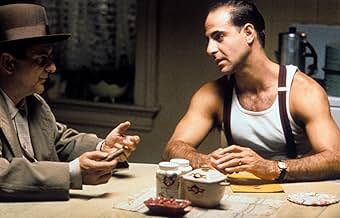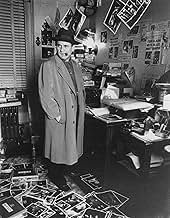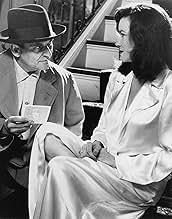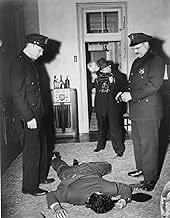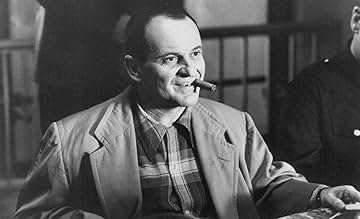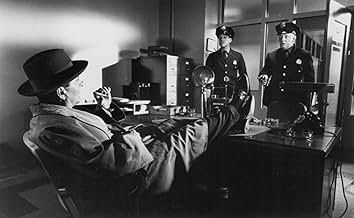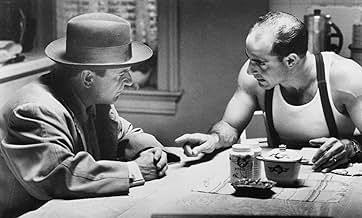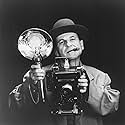IMDb RATING
6.5/10
4.7K
YOUR RATING
In the early 1940s, an infamous New York paparazzo gets an assignment from a club owner to do a background search on a mysterious gangster, which leads him down a very dangerous path.In the early 1940s, an infamous New York paparazzo gets an assignment from a club owner to do a background search on a mysterious gangster, which leads him down a very dangerous path.In the early 1940s, an infamous New York paparazzo gets an assignment from a club owner to do a background search on a mysterious gangster, which leads him down a very dangerous path.
- Awards
- 1 nomination total
Christian Stolte
- Ambulance Attendant
- (as Christian Stolti)
Gian-Carlo Scandiuzzi
- Maitre D' - Cafe Society
- (as Gian-Carlo Scanduzzi)
- Director
- Writer
- All cast & crew
- Production, box office & more at IMDbPro
Featured reviews
Joe Pesci plays the role of Leon "The Great Bernzini" Bernstein with accomplishment, as a kind of grubby, middle-aged everyman. Barbara Hershey, 44 when she made this movie, makes the screen sizzle by her mere presence as Kay Levitz. Pesci probably should have gotten an Oscar nomination for this performance, which is understated, sincere, and totally convincing. Some of the bit actors turn in good, solid performances with only a line or two.
The movie itself is heavy handed in spots, but director Franklin has written a number of movies and has a good ear for dialog. The mood of the piece is beautifully created and handled; camera work, lighting and music creating a real experience. The use of black and white sequences and inter-cutting of still photography is wonderfully handled. Maybe only a photographer can really appreciate the way Bernzini looks at the world as a photograph waiting to happen. People who are not willing to surrender to the experience of a movie will have less of a reaction to it.
The story is classic film noir, and more remarkable for being based on true events; blending together the great photographer Weegee (many of his photographs are actually used in the movie) and a gas-coupon scandal from the early days of American involvement in WWII. But, having said that, one misses the haunting quality this film conveys.
The movie itself is heavy handed in spots, but director Franklin has written a number of movies and has a good ear for dialog. The mood of the piece is beautifully created and handled; camera work, lighting and music creating a real experience. The use of black and white sequences and inter-cutting of still photography is wonderfully handled. Maybe only a photographer can really appreciate the way Bernzini looks at the world as a photograph waiting to happen. People who are not willing to surrender to the experience of a movie will have less of a reaction to it.
The story is classic film noir, and more remarkable for being based on true events; blending together the great photographer Weegee (many of his photographs are actually used in the movie) and a gas-coupon scandal from the early days of American involvement in WWII. But, having said that, one misses the haunting quality this film conveys.
Well, I've just seen the movie tonight and Pesci is certainly great in it. I finally saw a side of him that I've never seen before. In almost all his other movies, he got on my nerves, but in this one, he managed to make me respect his acting. I have to agree with the other comments. I've never heard of this movie and that's too bad. It's very touching and gave me a feeling of je ne sais quoi... It's a very attractive movie in a quiet sort of way. I don't know. I really enjoyed it and it's too bad that it hasn't been credited as one of Pesci's best (if not THE BEST) movies.
I appreciate that this film was more than a homage to film noir but actually advanced the genre to include populist themes and even women's issues. In many ways, this is film brun because so much effort is made to evoke the brown tones of the time which brought a warmer, less paranoid tone to the proceedings. Brown can be earthy or rich. Men wear brown suits and hats and chew on brown cigars. The nightclub is paneled in rich brown wood. Kay Levitz has brown hair. The script and direction showed a love for the time but a cynicism, too, of government collusion with organized crime to make money at the expense of the fighting men and the citizens during a time of war. I enjoyed the relationships between the characters and was touched by the pan of the cheering crowd of real people at the end, not usually seen in noir. To add to the comments about the actors: I also enjoyed Jerry Adler as Bernzini's friend and was intrigued by Jared Harris's Danny the Doorman.
I've never rated this movie that high but I've gone back to it three times since it came out about 15 years ago on tape, so maybe I am underrating this. There still is no DVD of it, at least in Region I, and that's frustrating. There's something intriguing about this story that drives me back to it.
Perhaps that is so because it's about a photographer, something I did, too, while being in the newspaper business for years and an art form I've always enjoyed. The story also takes place in the 1940s and I love the style and atmosphere of that era which is beautifully shown here.
Joe Pesci is Leon Bernzini or "The Great Bernzini," a newspaper photographer and Barbara Hershey is a mysterious woman who Pesci has the hots for. There is a lot of mystery in here with Hershey's character. Pesci takes gruesome photos, doesn't get involved with anyone but he's willing to make an exception with "Kay Levitz" (Hershey)..... but is she good or bad for him?
Sad to say, the filmmakers kind of make a hero out of basically a sleazy guy who has few, if any, morals. ("Bernzy" was "paparazzi" before they invented the word!). The movie also has an unsatisfying ending, particularly with Hershey's character.
However, I keep getting drawn back into multiple viewings of this and I'd sure like to see what it looks like with a good DVD transfer.
Perhaps that is so because it's about a photographer, something I did, too, while being in the newspaper business for years and an art form I've always enjoyed. The story also takes place in the 1940s and I love the style and atmosphere of that era which is beautifully shown here.
Joe Pesci is Leon Bernzini or "The Great Bernzini," a newspaper photographer and Barbara Hershey is a mysterious woman who Pesci has the hots for. There is a lot of mystery in here with Hershey's character. Pesci takes gruesome photos, doesn't get involved with anyone but he's willing to make an exception with "Kay Levitz" (Hershey)..... but is she good or bad for him?
Sad to say, the filmmakers kind of make a hero out of basically a sleazy guy who has few, if any, morals. ("Bernzy" was "paparazzi" before they invented the word!). The movie also has an unsatisfying ending, particularly with Hershey's character.
However, I keep getting drawn back into multiple viewings of this and I'd sure like to see what it looks like with a good DVD transfer.
I picked this up at the local grocery never having heard about it before, I thought it was a comedy, it is not. Joe Pesci scores one for the little guy that nobody likes in a big way. There is one confusing thing however. Was that Walter Winchell he was supposed to be friends with? That part confused me. There was also something said about the American mob families working with the Italian mob families to overthrow Italy in the movie era 1942. Was that true? Over all I really enjoyed it and for once could not predict the outcome. If you want something a little different, this is it.
Did you know
- TriviaIt took Howard Franklin 10 years before he could get his screenplay turned into a film.
- GoofsWhen Kay leafs through Bernstein' photo album, there is picture of a New York City taxi with a rectangular roof light which displays not only the word "Taxi" but also whether the taxi is off duty and its medallion number. Those signs did not come into service until the 1960s. In the 1940s, when the movie is set, New York City taxis used a variety of curved roof lights used in most other cities.
- Quotes
Kay Levitz: It doesn't matter what people say unless you believe them.
- SoundtracksYou Can't Say No to a Soldier
(1942)
Music by Harry Warren
Lyrics by Mack Gordon
Performed by Sammy Kaye and His Orchestra
Courtesy of Sandy Hook Records
- How long is The Public Eye?Powered by Alexa
Details
Box office
- Budget
- $15,000,000 (estimated)
- Gross US & Canada
- $3,067,917
- Opening weekend US & Canada
- $1,139,825
- Oct 18, 1992
- Gross worldwide
- $3,067,917
- Runtime
- 1h 39m(99 min)
- Color
- Aspect ratio
- 1.85 : 1
Contribute to this page
Suggest an edit or add missing content


